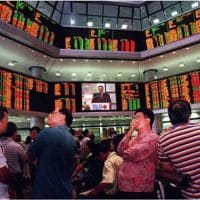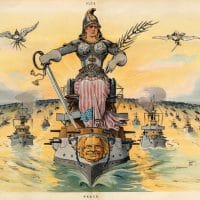-
Trump and the infrastructure of fascism
Let this be a warning to economists, labor leaders, Democratic officials and all progressives fighting for economic and social justice: “progressive-appearing” economic proposals from Trump are likely to be thinly veiled attempts to suck in unsuspecting allies in support of a neo-fascist, authoritarian movement that is increasingly showing its true colors. They are designed, quite clearly, to build support for Trump and his business allies. Don’t be fooled, don’t be bought off, and be vigilant.
-
Forgetting to remember
It is a devastating fact that James Baldwin is our contemporary; so much so, that the matter of his relevance seems either pressing or redundant depending on to whom one speaks. Raoul Peck’s I Am Not Your Negro, a “cinematic séance” (The Guardian), is being taken as the completion of Baldwin’s unfinished Remember This House, […]
-
The hidden environmental impacts of “platform capitalism”
New technological platforms like Uber are promising to reshape society: but what is the impact for people and the world we live in? What does this mean for our environment?
-
After neoliberalism, what next?
We may be living through one of those moments in history that future historians will look back on as a watershed, a period of flux that marked a transition to quite different economic and social arrangements. Unfortunately, in human history a ‘moment’ can be a very long time.
-
New School announces Harry Magdoff and Paul Sweezy fellowships
During their storied careers, Magdoff and Sweezy edited the journal Monthly Review, which Sweezy co-founded in 1949, and which still stands as the longest continuously published socialist magazine in the United States.
-
Twenty years after the Asian financial crisis
The hegemony of international finance capital, which led to economies “opening” themselves up to the vortex of global financial flows, demolished both Nehruvian dirigisme and East Asian neo-mercantilism. And the same hegemony has now brought the world capitalist economy to a crisis from which it is in no position to recover.
-
Monopoly vs. competition
Monopoly vs. competition
-
Diesels and honorable men
Lower the curtain, change the scene. The atmosphere in the government building in Berlin on August 2nd is fully different, not a bit of similarity. Those present, most in tailored apparel, sit in soft leather chairs and sip aromatic drinks from fine glassware. Who are they? Germany’s power people!
-
Amazon: becoming the market
Amazon is an unusual company. With a market capitalization hitting $500bn at the end of July and no profit to show, it is not a company trying to be a part of the market, it is trying to become the market.
-
Book of the day: The Corruption of Capitalism by Guy Standing
I recommend this book, along with the rest of Standing’s body of work, as an example of the kind of outside-the-box thinking the Left needs in place of the dinosaur Old Left’s organization and policy models if it is to be relevant to the new economy.
-
Prabhat Patnaik on contemporary capitalism and the shape it takes in India
I think Marxism analyses the contemporary world in a way which nobody else did. Lenin had said the strength of Marxism lies in the fact that it is true. The point is that it is a genuine scientific discovery.
-
Militarism and monopoly capitalism
Why are so many modern capitalist societies addicted to militarism? On the one hand, these societies are intensely growth oriented and expansionist. On the other hand, militarism is a convenient way of absorbing economic surplus and thereby countering the stagnationist propensity of monopoly capitalism.
-
Unions fight inequality
The decline in unionization is one of the most important factors promoting the concentration of income at the upper end of the income distribution. The statement may not surprise you, but the fact that this was the conclusion of an IMF study of the causes of inequality might.
-
Does David Roediger disagree with Ellen Meiksins Wood?
How does race relate to class in capitalism? Is it intrinsic and essential to the reproduction of capital, or merely an accidental feature of particular capitals? In this recent essay by Richard Seymour, and originally published on his Patreon, Seymour considers a debate within Marxism on the relationship between class, race and capitalism.
-
Political economy for radical lawyers
The latest issue of the London Review of International Law features an interesting review essay by Robert Howse, in which he makes the case for progressive international lawyers attending to the discipline of economics and the insights that can be gained from it, in particular from what he sees as more progressive economists. Howse’s essay […]
-
The mega rich are getting mega richer
The indirect effect of the increase in income inequality is economically more injurious than the erosion of company earnings or a stock market downturn.
-
The American empire and its media
Largely unbeknownst to the general public, many media executives and top journalists of almost all major U.S. news outlets, political and business magazines, public broadcasters and press agencies have long been members of the Council on Foreign Relations (CFR).
-
Race and ethnicity discrimination in the U.S. labor market
These racial/ethnic differences mean that our general push for more and better jobs must be accompanied by policies designed to overcome the discriminatory and segmented nature of the US labor market.
-
Social Security may bust the Federal budget – but not how you think
Both Democrats and Republicans have used social security funds to hide government debt—i.e., to trick the public. This was made possible by a huge surplus engineered by fund actuaries to account for baby boomers. In the next few years the fund will need to cash in on its bonds and this will cause the federal debt to balloon.
-
Eugene Debs and the Kingdom of Evil
Eugene Victor Debs was not only the builder of the social movement in America but arguably the most important political figure of the 20th century, before being crucified by the capitalist class when he and hundred of thousands of followers became a potent political threat. The most notable moments of Debs life were the railroad strikes in 1894, his campaign for Congress in 1916 until he was arrested under the Sedition Act by President Wilson and finally his speech moments before his sentencing in 1918.




















